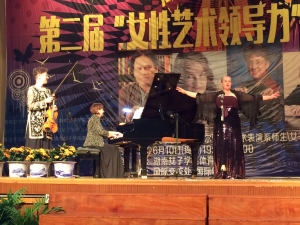When Scripps Interim President Amy Marcus-Newhall stepped up to the microphone at Hunan Women’s University (HWU) in Hunan, China, and spoke her first words, “Dà jiÄ hăo” (“Hello everyone”), she was met with roaring applause from more than 5,200 students.
Marcus-Newhall was speaking at HWU as part of a Scripps delegation that traveled to the university in June. Led by Anne Harley, assistant professor of music and chair of the Music Department, the delegation included Scripps faculty members Gayle Blankenburg, lecturer in music; Thierry Boucquey, professor of French; Piya Chatterjee, Backstrand Chair of Gender and Women’s Studies and chair of the Feminist, Gender and Sexuality Studies Department; Hao Huang, Bessie and Cecil Frankel Endowed Chair in Music and professor of music; and Rachel Vetter Huang, adjunct professor of music, as well as three Scripps students: Moore (Youming) Chen ’16, Yuqing Lei ’18, and Rachel (Yinghan) Qi ’17.
The purpose of the visit was to foster an intellectual and cultural exchange between the schools. While there, Scripps professors taught over 20 classes, met with university administrators to discuss education policy and teaching practices, and performed as apart of a gala concert that showcased both Eastern and Western music.
The trip also provided an opportunity to exchange information about approaches to women’s education. Out of the five women’s universities in China, HWU is the largest, with approximately 9,000 students. The university focuses on occupational training, with the purpose of preparing the many students who come from lower socioeconomic backgrounds for jobs after graduation. As the concept of the liberal arts college is fairly new in the smaller cities of China, the Scripps delegation hoped to share Scripps College’s unique approach to women’s education.
As a Scripps student, Lei wanted to share her experiences with HWU students to demonstrate how a liberal arts education might provide a favorable alternative to the courses offered at larger, more comprehensive Chinese universities emphasizing professional training.
“I wanted to introduce the concept of liberal arts education and liberal arts colleges to more Chinese students…and to encourage more Chinese college students to think beyond professional training, to expand their focus to the Humanities and Arts,” Lei said.
The Scripps students who participated in the trip also acted as administrative liaisons, translating class lectures that delved into subjects such as “The Development of Social Gender and Women Students” and “Feminist Theory and Theoretical Schools Studies.” While the students helped translate during lectures and meetings, they also found themselves utilizing the skills they have been developing at Scripps.
“The trip gave me opportunities to exercise my abilities and communication skills, and let me practice what I learned in interactive classes at Scripps,” says Lei. “I got a chance to apply the critical thinking I was encouraged to develop in Core to real-life situations, observing how power dynamics work and how gender influences someone’s social role.”
The cultural and educational exchange between HWU and Scripps also resonated personally for the Scripps faculty members.
Through class lectures and piano master classes, Professor Hao Huang was able to fulfill his promise to his father of promoting mutual understanding between the United States and China as a professor. He also traces his ancestral roots back to Hunan, China, and was able to visit his father’s old family homestead Wanliwu for the first time. He paid respects to the graves of his grandfather and great-great grandfather before he returned.
“On our first day, I saw a photograph of my great uncle, General Huang Xing, who helped Dr. Sun Yat-sen successfully overthrow the Qing Dynasty. Huang Xing is a well-known Hunanese hero. It was truly a family affair!,” said Professor Huang.
Professor Boucquey was able to reacquaint himself with Chinese culture and the Mandarin language through ESL classes and ESL pedagogy demonstrations for HWU English majors:
“The HWU visit was so rewarding in terms of personal interaction with the HWU faculty and students. All of the faculty with whom I did have contact were extremely welcoming and friendly, and were genuinely interested in learning and mastering a new foreign language pedagogy. As for the students, I was touched by their enthusiasm and readiness to embrace being taught in a totally new way.”
In all, the trip was deemed a great success by HWU faculty and students. “They were profusely astonished by and grateful for the quality of instruction and intellectual exchange offered by our delegation,” says Huang. “Several faculty have already been invited back, which is the best indication of overseas success.”

